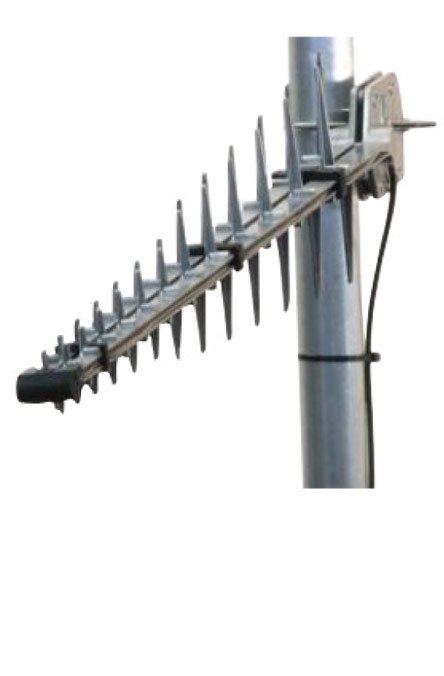Log Periodic Antenna Applications
In 1954, edwin turnur started messing with a dipole antenna. As shown in the illustration of figure 18, it is in fact comprised of a set of dipoles, all active, that vary in size from smallest at the front to largest at the rear. It is exactly this idea, which led to the invention of antenna arrays. An antenna array is a radiating system, which consists of individual radiators and elements. The antenna is fed from an intermediate point a distance from the grounded end.

This antenna is based on the dipole element.
The design has two advantages over a simple monopole: An antenna array can be better understood by observing the following images. Observe how the antenna arrays are connected. This antenna is made of a series of dipoles placed along the antenna axis at different space intervals of time followed by a logarithmic function of frequency. This antenna is based on the dipole element. In 1954, edwin turnur started messing with a dipole antenna. It is exactly this idea, which led to the invention of antenna arrays. Whether you desire an antenna for emc, wireless or rf applications, the large selection of quality antennas is sure meet your needs and exceed your expectations. The antenna is fed from an intermediate point a distance from the grounded end. An antenna array is a radiating system, which consists of individual radiators and elements. Other applications of spiral antennas include gps, where it is advantageous to have rhcp (right hand circularly polarized) antennas. Instead of leaving the arms straight, he. As shown in the illustration of figure 18, it is in fact comprised of a set of dipoles, all active, that vary in size from smallest at the front to largest at the rear.
A directional antenna or beam antenna is an antenna which radiates or receives greater power in specific directions allowing increased performance and reduced interference from unwanted sources. Observe how the antenna arrays are connected. It is exactly this idea, which led to the invention of antenna arrays. Each of this radiator, while functioning has its own. 3147 log periodic dipole array antenna.

The design has two advantages over a simple monopole:
Each of this radiator, while functioning has its own. It is exactly this idea, which led to the invention of antenna arrays. Observe how the antenna arrays are connected. Klm log periodic antenna email protected The antenna is fed from an intermediate point a distance from the grounded end. Other applications of spiral antennas include gps, where it is advantageous to have rhcp (right hand circularly polarized) antennas. An antenna array can be better understood by observing the following images. An antenna array is a radiating system, which consists of individual radiators and elements. 3147 log periodic dipole array antenna. Whether you desire an antenna for emc, wireless or rf applications, the large selection of quality antennas is sure meet your needs and exceed your expectations. A directional antenna or beam antenna is an antenna which radiates or receives greater power in specific directions allowing increased performance and reduced interference from unwanted sources. This antenna is made of a series of dipoles placed along the antenna axis at different space intervals of time followed by a logarithmic function of frequency. The design has two advantages over a simple monopole:
A directional antenna or beam antenna is an antenna which radiates or receives greater power in specific directions allowing increased performance and reduced interference from unwanted sources. An antenna array can be better understood by observing the following images. An antenna array is a radiating system, which consists of individual radiators and elements. The antenna is fed from an intermediate point a distance from the grounded end. 3147 log periodic dipole array antenna.

Each of this radiator, while functioning has its own.
This antenna is based on the dipole element. An antenna array can be better understood by observing the following images. In 1954, edwin turnur started messing with a dipole antenna. The antenna is fed from an intermediate point a distance from the grounded end. 3147 log periodic dipole array antenna. Directional antennas provide increased performance over dipole antennas—or omnidirectional antennas in general—when greater concentration of radiation in a certain … This antenna is made of a series of dipoles placed along the antenna axis at different space intervals of time followed by a logarithmic function of frequency. Whether you desire an antenna for emc, wireless or rf applications, the large selection of quality antennas is sure meet your needs and exceed your expectations. Each of this radiator, while functioning has its own. A directional antenna or beam antenna is an antenna which radiates or receives greater power in specific directions allowing increased performance and reduced interference from unwanted sources. Klm log periodic antenna email protected It is exactly this idea, which led to the invention of antenna arrays. Observe how the antenna arrays are connected.
Log Periodic Antenna Applications. Whether you desire an antenna for emc, wireless or rf applications, the large selection of quality antennas is sure meet your needs and exceed your expectations. A directional antenna or beam antenna is an antenna which radiates or receives greater power in specific directions allowing increased performance and reduced interference from unwanted sources. The antenna is fed from an intermediate point a distance from the grounded end. Instead of leaving the arms straight, he. The design has two advantages over a simple monopole:
Post a Comment for "Log Periodic Antenna Applications"